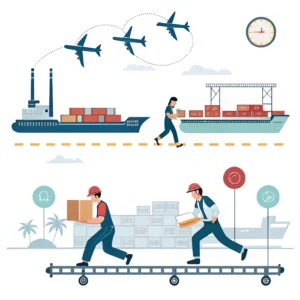DDP is an Incoterms® 2020 rule where the seller assumes maximum responsibility for delivering goods to the buyer’s specified destination, covering all costs, risks, taxes, and duties until the goods are made available to the buyer. It is often used when sellers have expertise in the buyer’s local import regulations or when buyers want a "turnkey" shipping solution.
Key Features of DDP
-
Seller’s Responsibilities:
- Arrange and pay for all transportation costs (from origin to final destination).
- Handle export and import customs clearance, including duties, taxes, and documentation.
- Purchase insurance (optional but recommended to protect goods in transit).
- Deliver goods to the agreed destination (e.g., buyer’s warehouse, port, or terminal).
-
Buyer’s Responsibilities:
- Unload the goods at the destination (unless otherwise agreed).
- Inspect and accept the cargo upon delivery.
- Provide assistance (if required) for import processes (e.g., sharing tax IDs).
-
Risk Transfer Point:
- Risk transfers from seller to buyer when goods are ready for unloading at the final destination.
DDP vs. Other Incoterms
-
DDP vs. DAP (Delivered at Place):
- Under DAP, the seller delivers goods to the destination but does not pay import duties or taxes; the buyer handles customs clearance.
- Under DDP, the seller covers all costs, including duties and taxes.
-
DDP vs. EXW (Ex Works):
- EXW places minimal responsibility on the seller (goods available at their premises); the buyer handles all logistics and costs.
- DDP is the opposite: the seller manages everything.
-
DDP vs. CIF (Cost, Insurance, Freight):
- CIF applies only to sea freight and ends at the destination port; the buyer handles import clearance.
- DDP covers end-to-end delivery, including inland transportation and import processes.
Advantages and Disadvantages of DDP
Advantages
- Buyer Convenience: The buyer has no logistical burden—ideal for inexperienced importers.
- Cost Predictability: All fees (duties, taxes, shipping) are included in the seller’s quote.
- Risk Mitigation: Seller bears liability for loss/damage until goods reach the destination.
Disadvantages
- Higher Costs: Sellers often inflate prices to cover potential risks or unexpected fees.
- Limited Control: Buyers cannot choose carriers or influence shipping timelines.
- Seller Expertise Required: If the seller lacks knowledge of the buyer’s import regulations, delays or penalties may occur.
- Risk of Abandonment: If customs issues arise, sellers may abandon shipments, leaving buyers with losses.
When to Use DDP?
- Stable Supply Chains: Predictable routes and established trade relationships.
- Seller Expertise: The seller has proven experience in the buyer’s country (e.g., a Chinese factory regularly exporting to the EU).
- Low-Volume/High-Value Goods: Buyers prioritize convenience over cost savings (e.g., luxury items).
Example Scenario:
A U.S. retailer imports electronics from a trusted supplier in China under DDP terms. The Chinese supplier arranges door-to-door shipping, pays U.S. import duties, and delivers the goods to the retailer’s warehouse in Los Angeles. The retailer only unloads and inspects the cargo.
Common Questions (FAQ)
-
Does DDP include unloading costs?
- No. Unless specified, the buyer bears unloading costs.
-
Can DDP be used for air freight?
- Yes. DDP applies to all transport modes (air, sea, road, rail, or multimodal).
-
Who is the importer of record under DDP?
- The seller (or their agent) acts as the importer of record, which can complicate liability in some countries.
-
What if customs rejects the shipment?
- The seller is responsible for resolving issues, but if they fail, the buyer may face delays or financial losses.
-
Is insurance mandatory under DDP?
- No, but sellers often include it to protect against transit risks.
Key Considerations for Buyers
- Verify Seller Expertise: Ensure the seller understands your country’s import regulations.
- Review Contracts Carefully: Clarify responsibilities for unloading, insurance, and dispute resolution.
- Compare Costs: DDP quotes may be higher than managing logistics independently (e.g., using FOB).
Conclusion
DDP offers a hassle-free solution for buyers but requires trust in the seller’s ability to navigate complex logistics and customs processes. It is best suited for low-risk, high-value shipments or when the seller has a strong track record in the buyer’s market. Buyers should weigh the convenience against potential costs and loss of control over shipping.








